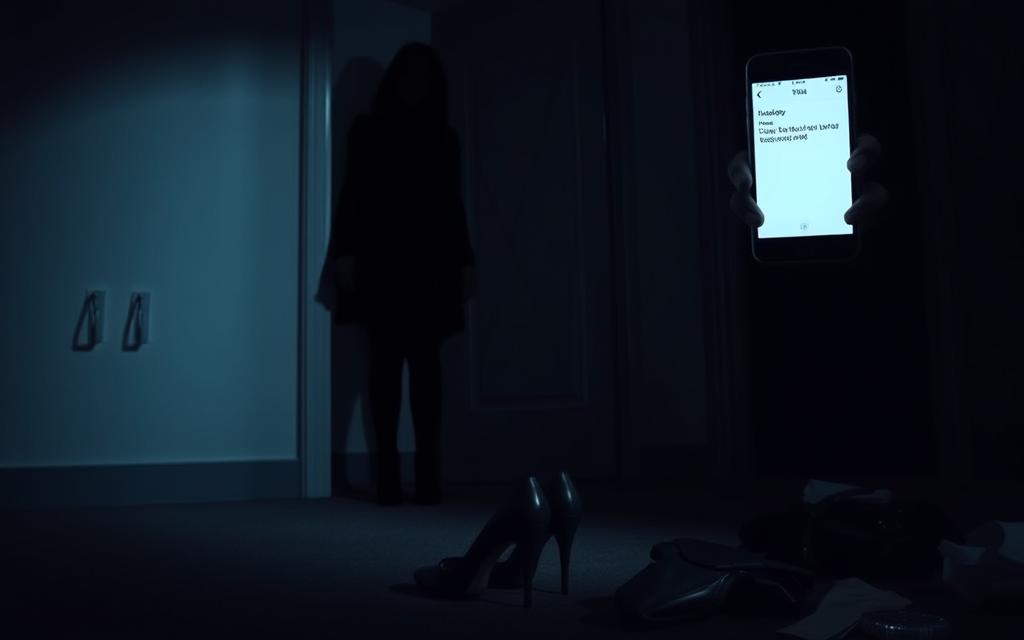Infidelity can deeply hurt a relationship, leaving lasting scars. Some people are shocked when they find out their spouse cheated. Others might sense something is wrong due to odd behaviors. But how do you really know if your husband is cheating? This guide will cover common signs of cheating, helping you spot red flags and take action.
We’ll look at changes in how you talk to each, different grooming habits, and money issues. These signs might show your husband is being unfaithful. Understanding why people cheat and its effects on relationships will help you deal with this situation.
It’s important to know the signs of cheating to keep a strong, trusting relationship. Whether facing a possible affair or wanting to get closer to your partner, this guide offers key insights. It will help you on your journey.
Understanding the Psychology Behind Infidelity
Infidelity in marriage is often linked to deep-seated issues. [https://infidelityhub.com/confronting-a-cheating-husband-or-wife-expert-guide/]These can include relationship dissatisfaction, emotional disconnection, and personal insecurities. Knowing these factors helps explain why some husbands might cheat.
Common Reasons Why Husbands Cheat
Studies show that husband’s unfaithfulness can be due to several reasons. Some common causes include:
- Lack of emotional intimacy and connection in the relationship
- Unmet personal needs, such as a desire for excitement or validation
- Underlying issues like low self-esteem or dissatisfaction with one’s life
- Situational factors, such as increased opportunities for extramarital encounters
The Impact of Technology on Modern Affairs
Technology has greatly influenced infidelity in marriage today. Social media, messaging apps, and online platforms make it easier to find affair partners secretly. This ease can tempt husbands to be unfaithful.
Understanding Risk Factors in Marriage
Some relationship dynamics and personal traits can raise the risk of identifying infidelity. Poor communication, unresolved conflicts, and personal insecurities can make a couple more susceptible. Recognizing these can help prevent infidelity in marriage.
Understanding the psychology behind husband’s unfaithfulness helps couples tackle the root causes. [https://infidelityhub.com/confronting-a-cheating-husband-or-wife-expert-guide/]This knowledge empowers partners to spot potential issues and act to prevent infidelity in marriage.
Suspicious Changes in Physical Appearance and Grooming Habits
Changes in your husband’s looks and grooming habits can be a big sign of cheating. Self-improvement is good, but when it’s with other odd behaviors, it might mean trouble – spotting cheating behavior.
Studies show cheaters often change how they look. They might start dressing differently, lose weight, or pay more attention to their grooming. These signs could mean they’re trying to impress someone new.
- Sudden interest in personal grooming
- Wearing new or different styles of clothing
- Unexplained weight loss or physical transformation
Also, if your partner is secretive about their phone, it could be a sign. If they start using passcodes or hiding their phone, it might mean they’re cheating.

Just because your husband looks different doesn’t mean he’s cheating. But, it’s worth noticing if it’s part of other odd behaviors. Paying attention to signs of infidelity can help you understand your relationship better and take action if needed.
Digital Red Flags: Phone and Computer Behavior
In today’s world, changes in how your spouse uses technology can hint at cheating. Look out for sudden password changes, more privacy settings, or new email accounts. They might also become hard to reach at times, clear their browser history often, or stop using shared devices.
Password Changes and Privacy Settings
Kim Komando says many people hide their phones from others to keep their privacy. But, cheaters might turn off notifications or hide their phones from their partners. Komando notes that those up to no good often clear their browser history to hide their tracks.
Suspicious Social Media Activity
If your spouse’s social media use drops or changes, it could mean they’re hiding something. Look out for unexpected changes in their profile settings, less interaction with friends and family, or new accounts.
New Email Accounts and Hidden Apps
Cheaters might use fake apps, like Calculator Pro+, to hide messages or photos. Deleted items can often be found in the trash or recycle bin on computers or cloud services. Some might use work documents to hide messages from their partners.
How Can You Know If Your Husband Is Cheating: Key Behavioral Changes
Spotting cheating in your relationship can be tricky. Looking for signs often means noticing small changes in how he acts and talks. These changes can tell you a lot.
One sign is if he starts criticizing you more. He might pick fights or ignore your feelings. This could mean he’s feeling guilty about something.
- Less intimacy at home and more outside affection are warning signs.
- Changes in how he talks to you, like not sharing or sharing too much, could mean he’s hiding something.
- New interests or a sudden change in how he looks might show he’s trying to impress someone else.
Also, if he’s spending more money than usual, it could be for an affair. Trusting your gut and noticing these signs is key to fixing problems in your relationship.

Before taking action, make sure you have solid evidence. Getting legal advice is also a good idea. Being careful and open can help you handle this situation well.
Changes in Work Schedule and Daily Routines
Changes in your husband’s work schedule or daily routines might hint at infidelity. Look out for signs like him being away more often. He might give vague answers or suddenly have more business trips. If he seems uninterested in sharing his new activities, it’s a red flag.
Unexplained Absences
If your husband is away more without a good reason, it could mean he’s cheating. Notice any unexplained absences. They might suggest he’s meeting someone else.
New Patterns in Daily Activities
New hobbies, gym visits, or social events could hint at infidelity. If these activities mean less time with you, it’s worth looking into.
Business Trip Frequency
- More business trips or longer stays could be a sign of cheating.
- If these trips seem too frequent or your husband is secretive, it’s time to ask questions.
While changes don’t always mean cheating, pay attention to unusual patterns. Trust your gut and talk openly with your spouse if you’re worried about signs of infidelity.
Financial Warning Signs and Unexplained Expenses
When trying to [catch a cheating spouse](https://infidelityhub.com/how-to-catch-a-cheating-wife/), watch for financial red flags. Cheating often means spending on gifts, dinners, and hotel rooms. Checking your financial accounts can reveal [signs of infidelity](https://infidelityhub.com/how-to-catch-a-cheating-wife/).
Look for strange charges on credit cards, unexplained cash withdrawals, or sudden secrecy about money. A study found that 31% of adults in a relationship consider hiding a credit card or bank account worse than physical cheating. Also, 2 in 5 U.S. adults admit to financial infidelity.
- Defensiveness when questioned about money could indicate a deeper problem.
- Changing to a cash-only system, with large cash withdrawals, is a red flag for financial infidelity.
- Lack of communication about finances is a big issue leading to financial infidelity.
If you suspect financial [infidelity](https://infidelityhub.com/how-to-catch-a-cheating-wife/), talk calmly with your partner. Getting help from a financial planner or couple counselor can guide you. They can help you discuss financial matters and solve any issues.
Remember, financial infidelity can stem from innocent reasons like saving for a special occasion or malicious plans to leave. Being alert and open in communication can help you [catch a cheating spouse](https://infidelityhub.com/how-to-catch-a-cheating-wife/). It also helps address financial concerns in your relationship.
Changes in Emotional Intimacy and Connection
If your husband’s emotional connection with you has changed, it might be a sign of infidelity in your marriage. A drop in emotional closeness can show up in many ways. This includes poor communication, feeling distant, and not caring about planning for the future.
Communication Breakdown
If your partner seems less open or doesn’t want to be emotionally close, it might mean they’re focused on someone else. Good relationships need open and honest talk. So, if this stops, it’s a warning sign.
Emotional Distance
Feeling emotionally distant from your husband could mean he’s invested in someone else. Emotional cheating is about forming a deep bond with someone else, hurting your relationship.
Lack of Future Planning
Not wanting to plan for the future or talk about long-term dreams is a red flag. If your partner is emotionally unfaithful, they might not see a future together.
Noticing these changes in emotional closeness can help you spot if your husband is cheating. By paying attention to these signs, you can start fixing problems in your relationship.
Sexual Relationship Changes and Red Flags
Big changes in your sexual life with your husband might mean he’s being unfaithful. Look out for a drop or rise in sex, new moves in bed, or feeling distant during intimacy. Also, finding a sexually transmitted infection could point to an affair.
Watch for any odd shifts in your sex life. If your husband suddenly loses interest or seems hesitant to be close, it might be a problem. On the other hand, if he starts trying new things, it could mean he’s learned from someone else.
A strong sex life is key to a happy marriage. If it starts to fade, it could mean deeper issues, like your husband’s infidelity. Talking about these changes openly and with kindness is vital to figuring out what’s wrong and moving forward.

Keep in mind, changes in sex life don’t always mean cheating. They could also point to other problems. It’s crucial to be open-minded, try to understand what’s happening, and work together to bring back closeness and trust.
Communication Patterns and Defensive Behavior
Dealing with a cheating husband is tough, and their defensive behavior is often the most frustrating part. When you confront them, they might react emotionally, either by attacking you or becoming silent. This makes talking things through even harder and can make problems worse.
Typical defensive behaviors in a cheating husband may include:
- Stonewalling and Avoidance: They might ignore you, change the topic, or not answer your questions. This shuts down the conversation.
- Gaslighting Techniques: Some might try to make you question your own thoughts. They aim to confuse and make you doubt yourself.
These behaviors are often a way to avoid taking responsibility for their actions. It’s key to understand that being defensive is different from standing up for oneself. You should aim to hold your spouse accountable without getting into pointless arguments.
Notice if your husband’s communication changes, like becoming more short-tempered or vague. If you think he might be cheating, be patient and empathetic. Be ready to have tough talks, even when he gets defensive.
Physical Evidence and Tangible Signs
Catching a cheating spouse is tough, but some signs can help. It’s key to have solid proof before talking about it. Knowing these signs can guide you through the uncertainty.
One sign is unfamiliar scents on your partner’s clothes or skin. This could be a new perfume or cologne. Also, changes in grooming habits like showering more or using new products might make you suspicious.
- Finding unfamiliar items in your partner’s things, like receipts or small gifts, could mean trouble.
- Seeing differences in your partner’s sexual energy or performance might suggest they’re exploring new things with someone else.
Be careful with these signs and don’t jump to conclusions. Keeping a detailed journal of what you notice can help you see patterns. This way, you can understand the situation better before talking to your partner.

Physical evidence is important, but remember the whole picture of your relationship. If you’re really worried, talking to a professional is a good idea. Talking about it openly but gently might help you find out the truth. This could lead to fixing things or making tough choices.
Changes in Social Circle and Friend Behavior
Finding out if your partner is cheating can be hard. But, changes in their friends might be a clue. If their friends act weird or too friendly, it could mean they know something you don’t.
Your friends might also start to steer clear of talking about your relationship. This could mean they know about the identifying infidelity in your marriage. Sometimes, friends find out about an affair before you do. Their awkwardness or avoidance can be a big hint.
- Discomfort of your partner’s friends around you
- Overly nice behavior from your partner’s friends
- Your friends avoiding discussions about your relationship
Keep an eye on any changes in your social circles. These can be subtle indications that something’s off in your relationship. If you notice a change in how your partner’s friends or your friends act around you, it’s worth looking into.
Finding out if your partner is cheating is complex and sensitive. But, noticing changes in their social behavior can give you clues. By staying alert and open to talking about your concerns, you can work to fix your relationship.
Understanding Your Gut Feelings and Intuition
Your gut instinct is a powerful tool when it comes to spotting cheating behavior. [https://huddlesapp.co/gut-feeling-he-is-cheating-no-proof/] While solid evidence is crucial, your intuition can hint at relationship issues. It’s vital to know the difference between real concerns and unnecessary worries.
Recognizing Valid Concerns
Research indicates that 85% of women who feel their partner is cheating are correct. Intuition is often calm and prompts action, unlike fear, which causes anxiety. People describe intuition as a quiet, knowing feeling, while fear makes them feel uneasy.
Your past experiences can shape your feelings of fear and distrust. Yet, choosing to trust and love in a relationship can positively influence your partner. Those who feel loved and valued are less likely to cheat, but honesty and commitment are key.
Differentiating Between Paranoia and Reality
Showing love, support, and appreciation can strengthen your bond and trust. 86% of people who dreamed of their partner cheating found it to be true. This shows how powerful our intuition can be, sometimes in surprising ways.
Talking to a therapist or a trusted friend about your gut feelings is wise. 78% of psychotherapists suggest this to ensure you’re addressing real concerns, not just paranoia.

Intuition combines human experience and brain reactions to social cues. 64% of women and queer individuals are known for their intuitive skills, which are essential for safety. By trusting yourself, journaling, and meditating, you can improve your intuition and handle relationship complexities better.
How to Document Suspected Infidelity
If you think your husband might be cheating, it’s key to gather evidence. This evidence is crucial if you plan to talk to him or get help. It can be very important in dealing with a cheating husband.
Begin by noting any odd behaviors, missing times, or money issues. This might include:
- Changes in how your partner looks or their grooming
- Changes in how they talk to you or show feelings
- Unusual spending or sudden money changes
- Strange online activities, like password changes or secret apps
When you collect evidence, do it quietly and carefully. You might need a private investigator’s help. The aim is to have solid proof without risking your safety or legal rights.
The evidence you gather can help you understand the situation better. It can also guide your actions. By being careful and thoughtful, you can face this tough time with more confidence and control.
Conclusion
Discovering infidelity can be very hard, but it doesn’t have to end a relationship. If you think your husband might be cheating, getting help from a couples counselor is a good step. It’s also important to take care of your mental and physical health during this tough time.
Deciding whether to talk to your partner or get support first is up to you. Remember, rebuilding trust after cheating is possible with honest talks and a real commitment to each other. Don’t hide things, as this can make things worse and stop true healing.
Choosing to stay or leave a relationship is a big decision. Talk to people you trust, like friends, family, or a therapist, for advice. With the right support and a willingness to face issues, you can rebuild trust after infidelity and have a stronger relationship.
